At the University of Macau (UM), a ponytail wearing British professor adeptly merges academic research with his passion for music. By day, as a scholar devoted to tourism research, he is dressed impeccably in a suit, giving lectures in the Faculty of Business Administration (FBA) building where sunlight streams through the windows. At the podium, he captivates his students with insightful and enthusiastic analyses of the latest trends in travel and tourism. By night, he transforms into the heartbeat of a band, taking his place at the back of the stage where he plays the drums and cymbals with infectious energy. This UM scholar is Prof Glenn McCartney, associate dean of FBA and associate professor in the Department of Integrated Resort and Tourism Management. He is also ranked among the world’s top two per cent of most-cited scientists.
A drummer who studies the night-time economy
As the spotlight falls on the stage at The Roadhouse Macau, Prof McCartney’s dynamic drumstick beats drive the rock music, instantly energising the crowd. The audience moves to the rhythm, and the atmosphere reaches a fever pitch. As the final echoes of the cymbals fade into silence, Prof McCartney steps off the stage with his band mates, met with a wave of applause and cheers.
‘This is the power of music,’ Prof McCartney says as he wipes the sweat from his forehead. ‘I can really see how music influences people’s emotions and behaviour.’ He gestures to the audience in the front row.
Prof McCartney is a scholar dedicated to the study of diverse tourism experiences. While he is immersed in the joy he brings to his audience as a musician, he also takes the opportunity to observe the audience members. He says excitedly, ‘When more than a hundred people ecstatically sway to the music, it is not just a music event—it is a vivid snapshot of the night-time economy.’
In recent years, Prof McCartney has focused some of his research on using the night-time economy to drive Macao’s tourism development and economic diversification. Known for his work on ‘destination image and branding’ as well as ‘tourism management’, Prof McCartney has published numerous academic papers about Macao. In these articles, he explores approaches to enhance the city’s destination image, attempts to develop a diversification strategy, and provides comparative insights from international travel, tourism and hospitality case studies. He is committed to promoting the sustainable development of Macao tourism through his academic work.
Cities across Asia and the Greater Bay Area are currently developing their night-time economies. Prof McCartney has observed that for Macao, which positions itself as a ‘world centre of tourism and leisure’, the night-time economy represents far more than an extension of traditional entertainment into the later hours. Instead, it plays a crucial role in building Macao’s unique urban identity and city image appeal. The night-time economy serves as a key reason for tourists to stay in Macao overnight and to increase their discretionary spending. It also attracts other segments such as those attending conferences and trade shows. Therefore, diversifying and supporting night-time tourism products is a pivotal strategy to unlock the potential of Macao’s night-time economy.
‘By integrating cultural heritage, music, and local characteristics into its night-time economy, I believe Macao can stand out in regional competition,’ Prof McCartney adds. However, he also highlights several critical considerations. ‘These include defining what makes Macao’s night-time economy unique and irreplaceable, assessing the impact of cross-border accessibility, balancing costs and benefits, venues, labour needs, and evaluating the effects on the community. To successfully address these issues, we need a shared vision and clear objectives for developing the night-time economy.’
Opportunity created by COVID
At the lecture podium, Prof McCartney is a cultured and refined professor. On stage, he is an energetic drummer. His passion for both academia and music allows him to navigate the ambiguous intersection between each area. Prof McCartney shares how a special experience not only enhanced his understanding of tourism studies but also added a different perspective to his work as a scholar and practitioner in the field.
When the COVID-19 pandemic swept across the world in 2020, Macao implemented a 21-day mandatory quarantine for overseas arrivals. Prof McCartney was among those who underwent this measure. During the isolation, he not only reignited his passion for rock music and picked up his drumsticks again after initially starting to drum a few years prior to the pandemic, but also used his scholarly insight to analyse the profound impact of the pandemic on Macao’s pillar industries. This 21-day quarantine period not only led to the formation of 21 Days, a rock band made up of several expatriates in Macao, but also inspired Prof McCartney to write several research papers on the critical challenges faced by the gaming and tourism industries. These papers were subsequently published in leading international journals and are widely cited.
‘The pandemic prompted Macao to rethink its heavy reliance on the gaming industry and highlighted the need to build a robust diversified tourism ecosystem,’ Prof McCartney explains. He continues with a vivid analogy. ‘Just as a good song may not solely depend on one artist, but also needs rich accompaniment from other band members, Macao can harness its distinctive culture through industry and public sector collaboration to incorporate new attractive tourism elements like medical tourism to create a distinct and memorable melody.’
Recently, under Prof McCartney’s coordination, FBA successfully hosted the first Macao Hengqin Medical Tourism Symposium. The event brought together nearly 100 representatives from government, academia, and industry to discuss the development prospects of wellness tourism. Prof McCartney highlights, ‘Our goal was to be a platform to foster meaningful dialogue among stakeholders and build consensus and recommendations on developing the “big health” industry.’
Building platforms for students to showcase their talents
The Macao Hengqin Medical Tourism Symposium came together successfully in an impressively short span of less than 2 months, an effort that could be likened to writing an impromptu musical composition. The inspiration behind this event was a research paper titled Betting on traditional Chinese medicine (TCM) within medical tourism development: the case of Macao, co-authored by Prof McCartney, his doctoral student Ink Wang and Yue Peng, a TCM physician. Through in-depth interviews with TCM experts located primarily in Hengqin and Macao, the study proposed fresh perspectives on the integration of the ‘big health’ industry within the tourism sector. Prof McCartney notes, ‘This research directly addresses the pressing challenges in Macao’s medical tourism development. My co-authors were meticulous in their data collection and analysis. The findings and recommendations truly deserve attention!’
For this reason, despite his heavy administrative and teaching responsibilities, Prof McCartney dedicated his time to organising the symposium. He did so in order to showcase some of the research results, but also to listen and gather perspectives from experts from the medical, tourism, and hospitality sectors. Reflecting on the intense yet rewarding preparation, Prof McCartney credited his event co-organiser and the team from Sands China who supported the event. Their enthusiasm made the impossible possible. ‘It was often sandwiches for lunch,’ he jokes.
Indeed, Prof McCartney is committed to building platforms that allow young scholars to showcase their talents. The academic forum ‘Mastering Cotai’ is the strongest evidence of this commitment. This was a platform in Macao that bridged academia with the integrated resort industry, and involved some post-graduate students, mostly from the Department of Integrated Resort and Tourism Management, who presented their research to industry executives. The event was also sponsored by industry professionals. In Prof McCartney’s view, authentic business education must enable students to step out of the ivory tower and engage with real-world industry practices. This philosophy is rooted is his own experiences: Prof McCartney spent several years working in the business world in Hong Kong and Macao before shifting his focus to academia. As a result, he has maintained the sharp instincts of an ‘industry practitioner’. This dual perspective enables him to accurately gauge market dynamics while maintaining a visionary outlook on industry evolution.
Leveraging the power of media
In addition to appearing on rock music stages and in university classrooms, one might also see Prof McCartney featured in local English or Portuguese newspapers, magazines, or television programmes. Prof McCartney is an active commentator in the Macao media circle, frequently sought after by the press for his international perspective and sharp insights.
‘Media is an important bridge between academia and the public. However, we must be aware that reading10,000-word papers full of regression analysis quickly over breakfast can be a challenge,’ Prof McCartney humorously notes. Over the past two decades, he has published numerous commentaries in media outlets such as Macau Business, Plataforma, Inside Asia Gaming, and Asia Gaming Brief, covering topics from convention and exhibition strategies, to destination branding, to tourist spending and travel motives. His insights always spark discussion. ‘How many commentaries have I published over the years?’ he jokes, ‘About as many cups of tea in the morning – I like tea!’
In the classroom, Prof McCartney places a strong emphasis on the importance of communicating academic results. ‘Your research shouldn’t just sit on a library shelf,’ he often tells his students. ‘Think like a CNN journalist: how would you explain your research, findings and perspectives in just 30 seconds?’ Under his guidance, students learn to translate complex academic jargon into easily understandable language.
Prof McCartney also offers tips on working with journalists: ‘I never send full PDFs of my papers to them. Instead, I prepare a one-page summary with key points and sometimes highlight relevant case studies. Journalists are busy each day with gathering news, so we need to be aware of this busy cycle of news gathering,’ he explains.
Calloused hands
Amid his packed schedule, Prof McCartney skilfully juggles administration, teaching, and research, while still carving out time to practice music every day—alternating among both drums and piano, as he has also played the piano since his teenage years. During the interview, he shows us his hands, calloused from drum practice yet still capable of writing rigorous academic papers. He shares, ‘Life is a journey about balance and about inspiring others hopefully with your passion.’ Looking at his calloused hands with a smile, he adds, ‘If you can enjoy the process along the way, that’s perfect.’
Chinese Text: Kelvin U, UM Reporter Ei Thazin Tun and Qi Zizheng
Photo: Kelvin U, with some provided by interviewees
Chinese Editor: Gigi Fan
English Translation: Bess Che
Source: My UM Issue 143
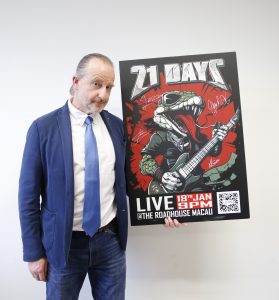
Prof Glenn McCartney
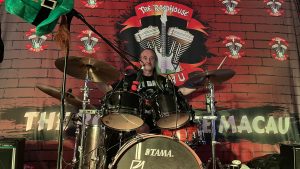
Prof McCartney performs on the stage in The Roadhouse Macau
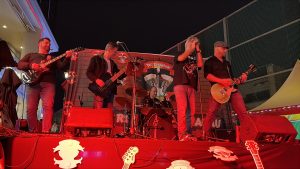
The rock band 21 Days
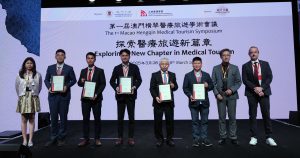
UM hosts the first Macao Hengqin Medical Tourism Symposium
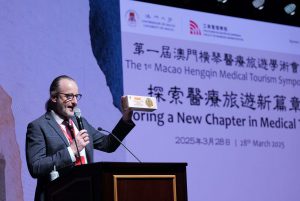
Prof McCartney speaks at the symposium
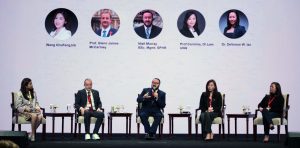
Prof McCartney and his doctoral student Wang Chufeng present their research results at the symposium
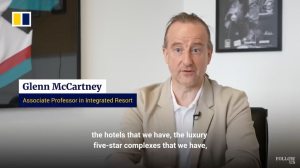
Prof McCartney is interviewed by the South China Morning Post
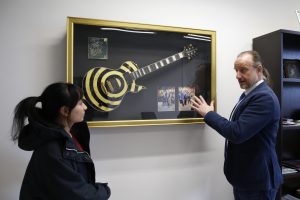
Prof McCartney shows a guitar from his collection to a UM Reporter
